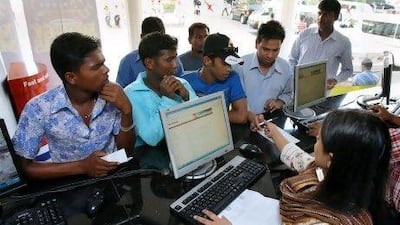Indians living in the Gulf have sent record sums of money home in remittances, taking advantage of the rupee's plummet against the dollar.
India Dispatch Inside the emerging giant
Keep pace with developing events in the BRICS economy Learn more
Measured against the Reserve Bank of India's reference rate, the rupee fell by nearly 13 per cent from 44 to the dollar on August 1to 49.7 to the dollar on September 23.
The UAE's Indian population alone yielded about US$60 million (Dh220.3m) in August and September, according to data from Indian asset management companies based in UAE. Market observers said the continuing rupee decline had created a good money-making opportunity for many. There are reports that many non-resident Indians (NRIs) have resorted even to borrowing to boost their remittances.
"Remittances into India from the Gulf region might have gone up as much as 60 per cent since August," said Krishnan Ramachandran, the chief executive of Barjeel Geojit Securities. "Indians are taking low-interest loans from Gulf-based banks and sending the money to their country. They make a clean profit doing so,"
Investors have been borrowing money from Gulf-based banks at 5 to 6 per cent and sending the money back home to get better returns.
"These are investors who typically borrow in offshore jurisdictions where dollar-denominated debt, along with forward cover and related costs, are available at about 5 to 6 per cent. The differential yield on such borrowings are thus quite attractive to such investors," Mr Ramachandran said.
But the effect is not immediate. "This does not necessarily mean that all these remittances translate into investments immediately," he said. "A large portion typically will go into bank deposits, followed by investments into domestic mutual funds, equities, etc."
The rupee has fallen because of the financial crisis in Europe, rising oil prices and India's current-account deficit. Inflation hitting 9 per cent for the 10th straight month in September also caused further uncertainty in the currency.
Indians are worrying about equity markets and are careful about investing in stocks, market makers said. Global equity markets are experiencing a crisis of confidence, and the Indian market is suffering from the same volatility that is occurring all over the world, leading NRIs to shy away from equities.
"The sentiments of the average investor is to wait and watch for some semblance of stability in the markets," Mr Ramachandran said. "The next two to three months will be crucial for the markets and they will determine the way forward for the coming year." But he warned that borrowing at any cost madelittle sense.
"Borrowing costs from Gulf-based banks are at about 10 to 11 per cent at present, and unless the end investment yields returns over 12 to 14 per cent, such borrowings are going to be counterproductive. This is not being realised by many, and they resort to borrowing to remit monies back home. Many of them also tend to withdraw cash using their credit card cash limits, which is at a huge cost." The increase in remittances has not gone unnoticed by the State Bank of India (SBI), which is set to launch a range of services for NRIs in the UAE.
"These services include opening of NRI accounts," said Debajyoti Ray Chaudhuri, the newly appointed chief executive of SBI's Dubai International Financial Centre operations, according to Indian media reports. "The bank would retain its focus on corporate products, trade finance and consolidate its operations from the Dubai International Finance Centre."
The Indian central bank also said recently it was relaxing some of its foreign exchange restrictions for NRIs to offer more freedom with transactions.
For more India coverage from The National visit www.thenational.ae/indiadispatch

